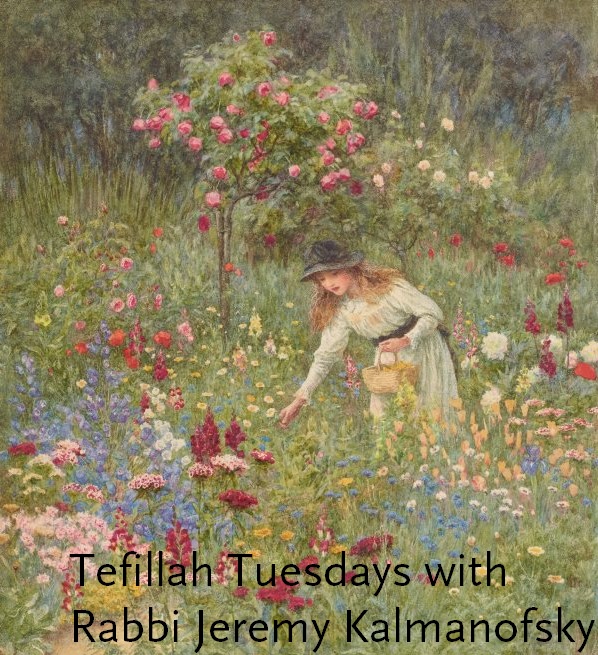Pesukei d’Zimra, the “verses of song” that open the morning liturgy, awaken us spiritually before the central prayer elements. Maybe you believe one or another Jewish teaching about God. Maybe you don’t. But if you want to daven, the minimum spiritual prerequisite is that you praise, that you gaze at each new morning and sing.
The standard Ashkenazic [i.e. non-Hasidic] Pesukei d’Zimra opens with a selection from I Chronicles 16 (closely paralleling Psalms 96) followed by a pastiche of Bible verses. The scholarly term for such a mélange is the Latin florilegium, or “gathering of flowers.” What a terrific name! Try to imagine ancient pray book editors wandering through the Bible, gathering blossoms to weave into a wreath. It calls to mind a Talmudic image [Hagigah 13b], that the angel Sandalfon weaves Israel’s prayers into “crowns” – probably floral wreaths, not metal crowns – for God’s head.
In this first bouquet we encounter a lovely flower from Psalm 81:
אנכי ה’ א’להיך המעלך מארץ מצרים הרחב פיך ואמלהו.
“I am the Lord your God who elevates [ma’al’kha] you from Egypt, open your mouth wide and I will fill it.”
This is among my favorite verses. On one level, it suggests a passionate kiss, mouth-to-mouth, between God and Israel. We modern Western Jews don’t often talk this way, but erotic images for the love of God are extremely central to mysticism, Jewish and others. Our verse is a powerfully suggestive case.
The simple semantic meaning of the phrase “open your mouth wide” is an encouragement to the worshipper to make audacious requests of God. Don’t pray for a hot roll with butter, like Bontshe schweig’s pathetically scanty dream, in Y. L. Peretz’s famous story. Shoot high and dream big. Demand another Exodus, a true redemption! Then, the Psalm says, God will “fill your mouth,” that is, grant your request.
R. Avraham Itzhak HaKohen Kook [in his siddur commentary, Olat Reiya, 1.219-220] captured what this verse demands of the davvening person. R. Kook calls attention to two features: first, the verse’s description not of yetziat Mitzrayim, “going out” of Egypt, but “elevation” from it; and second that the verb is in the imperfect tense – not that God once long ago brought us from slavery, but that this elevation goes on still.
“This elevation is unceasing and perpetual, applying to every soul, never concluding, always progressing. There is no limit to the loftiness of this aspiration. The only thing that can halt this ascent is the soul itself. Only when you constrict yourself, only when you limit your own aspirations can you hold back the process. But now that you know this secret, that I am the Lord your God who elevated you from the land of Egypt, you will perpetually take part in this ceaseless and infinite ascent. So you must open your mouth wide to soar above all boundaries, rise above all small-mindedness.”
When you daven this verse, ask yourself: what is my greatest aspiration, the best version of myself I can be? Then open your mouth, name your path of ascent, and God will take you there.
(Painting is Gathering flowers by Helen Allingham)





